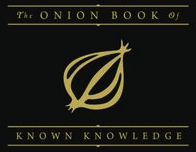The Thirst for Fake Knowledge: A Q&A With Seth Reiss, Head Writer of “The Onion”

Not content with publishing a fake newspaper, producing a fake news channel, and delivering the best satire on the Web to millions of genuine fans, the staff of The Onion has compiled a fake encyclopedia. Just in time for the death of print, The Onion Book of Known Knowledge: A Definitive Encyclopaedia of Existing Information: 183rd Imperial Edition appears in bookstores this week, billing itself as “the last book ever written.” In honor of its publication, and of the culmination of human scholarly achievement, Onion head writer Seth Reiss was kind enough to answer a few questions for Book Think.
Q: This is the first print encyclopedia I’ve glanced at since the World Books of my youth. Are you hoping nostalgia will be part of the book’s appeal?
A: Ultimately, we are hoping that people’s thirst for knowledge will lead them to this book. The appeal of this magnificent tome is that, essentially, for people to properly understand the world around them, they need this book. People need this book to survive. They need to know that a lemon is a special type of egg laid by a citrus duck, and that President John Tyler was widely believed to be the “Whig Strangler,” the serial killer who murdered 23 people in the Washington D.C. area from 1841 through 1844—the same exact years Tyler occupied the Oval Office. All of this valuable information is in The Onion Book of Known Knowledge.
Q: A number of entries “joke” about how grueling it is to compile an encyclopedia. What was the writing process actually like?
A: We pitched thousands and thousands of takes for various people, events in history, and just random things. There were some topics we knew we had to hit, like World War II and September 11, and for those entries we pitched numerous take ideas until we got the one we wanted. I think we must have pitched over 100 jokes for Abraham Lincoln before we landed on the entry we eventually we went with. That was the difficult part of writing this book: trying to come up with an original angle for things that have been joked about by comedian after comedian. In the end, the writing process mirrored how we select our headlines. The writers pitch a ton of ideas, we get together in a group, and we talk about the ones that we like the best. So, lots and lots of work gets thrown out and whittled down to what readers ultimately see.
Q: I loved the cross-referenced entries (“See POWDER-BLUE PLYMOUTH,” etc.) that, taken together, tell a little detective noir story. How did this gag develop?
A: I love that you noticed these entries! One of the cool things about this book is that the writers were typically assigned to come in with 10 to 15 take ideas for absolutely anything they wanted. That led to some pretty bizarre, demented entries. So, I believe that whole detective noir storyline came from the initial pitch for the Misty LaRue entry. We really liked the style that was written in because it was surprising, the voice was funny, and it added variety to the austere voice that comprises most of the book. And from there, we thought it would be fun to write a whole detective story that took place within the confines of the encyclopedia. Actually, I just found the original pitch in my e-mail. It was from one of the editors of the book and current Onion editor Will Tracy. “Misty LaRue, oh, why sure. Little redhead number who used to go waltzing around town with a fella named Valentine. Harry Valentine. (See: Valentine, Harry.)”
Q: The format reminded me at times of Ambrose Bierce’s Devil’s Dictionary, and the section headed by a made-up letter of the alphabet seemed inspired by Borges. Are there any other pretentious influences you’d like to name-check?
A: Ultimately, we landed on this format because it gave us the opportunity to write a joke about whatever we wanted. And the truth of the matter is that we knew it wasn’t the 100 percent most original concept in the world; several of us had definitely read or were aware of Devil’s Dictionary. But the thought of using our editorial and graphics team to put out a volume that would give The Onion‘s take on everything we could imagine from end tables, to turtles, to George Washington, to sympathy, was just too hard to resist.
The idea to do a completely fake letter came up pretty early on, and I’m glad we followed through on it. To me, that really takes the book over the top, and shows that we held absolutely nothing back when writing it. What I’m proud of is that it isn’t just a page of entries for a fake letter. Instead, there are five full pages devoted to a letter that doesn’t exist. That entire section creates an insane world, and I love that. I hope I’m not being too maudlin when I say that our staff was committed to making this a special book for ourselves and our readers.
Q: Why is my favorite [author/movie/food/geographical feature/Spanish naval victory] missing from the encyclopedia? Please apologize.
A: The Onion never apologizes. Not even when we helped fund the Japanese military in World War II. To this day, we believe that was a noble cause. To answer your question, everything in The Onion Book of Known Knowledge exists. Anything or anyone that is not in The Onion Book of Known Knowledge does not exist. We state this plainly in the front of the book.
Q: Which entry is your personal favorite?
A: Kitchen, if another room contains more knives than this room, get out of that house.
Q: Since many of the entries are topical, do you plan on releasing subsequent editions of the book? Any plans for a Web-based Onionpedia?
A: That Onionpedia thing sounds great. By the way, if I said that our writers didn’t go to Wikipedia to do research during the writing of this book, I would be lying my ass off. Overall, we did try to make entries as timeless as possible. For example, for the Barack Obama entry there were a lot of pitches in which the jokes sort of hung their hat on the upcoming election, or something what was going on in his presidency at the time. And we continually said that we needed one that captured his presidency in a broader context.
Q: Now that you’ve definitively summarized the entire store of human knowledge, what comes next in your career?
A: I’d like to run the Boston half marathon.





